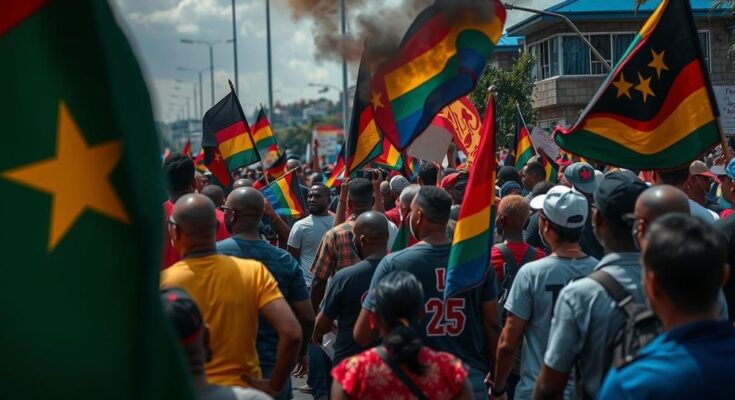Mozambique’s opposition leader, Venancio Mondlane, has called for protests against contested election results favoring the ruling Frelimo party, claiming electoral fraud. He has urged supporters to demonstrate across the country, particularly affecting transport and trade. The protests come amidst rising tensions following allegations of manipulation in the electoral process, as President Nyusi prepares to step down after his term.
In Mozambique, the leader of the opposition has called for significant protests this week against the recent election results that favored the ruling Frelimo party, which has maintained power since the nation gained independence from Portugal in 1975. Venancio Mondlane, who garnered 20 percent of the votes in the October 9 election, alleges that the election was rigged. Protests regarding the election outcomes have reportedly resulted in the deaths of 30 individuals, as per Human Rights Watch. Mondlane has expressed intentions to “paralyze all activities” from Wednesday to Friday and has urged supporters to stage demonstrations in major cities and key transport hubs, including the capital, Maputo, as well as at the country’s ports. He has particularly called on truck drivers to cease imports from South Africa to Maputo port. Meanwhile, President Filipe Nyusi is anticipated to step down in January, following the completion of his two-term mandate, transitioning leadership to Daniel Chapo, the candidate from Frelimo. Mondlane, a former radio presenter who is favored by younger voters, previously aligned with the opposition party Renamo before joining the Optimistic Party for the Development of Mozambique (Podemos) in June.
The political landscape in Mozambique has been dominated by the Frelimo party since the country’s independence in 1975. Recent elections held on October 9 saw Frelimo claim victory, but significant allegations of electoral fraud have been raised by the leader of the opposition. This tension has led to calls for mass protests in response to the results, reflecting a broader dissatisfaction with the government and electoral processes in Mozambique. The ongoing civil unrest speaks to deeper historical and political issues in the country, where opposition parties have often struggled against a well-established ruling party.
In conclusion, the situation in Mozambique highlights a pivotal moment for political discourse and civic engagement as calls for protests arise in response to contested electoral outcomes. The opposition leader’s push for mass demonstrations underscores the ongoing struggle for electoral integrity and reflects the broader discontent among citizens regarding governance in the nation. As the political transition looms, the actions of opposition parties and public response will be critical in shaping Mozambique’s democratic future.
Original Source: www.arabnews.com




